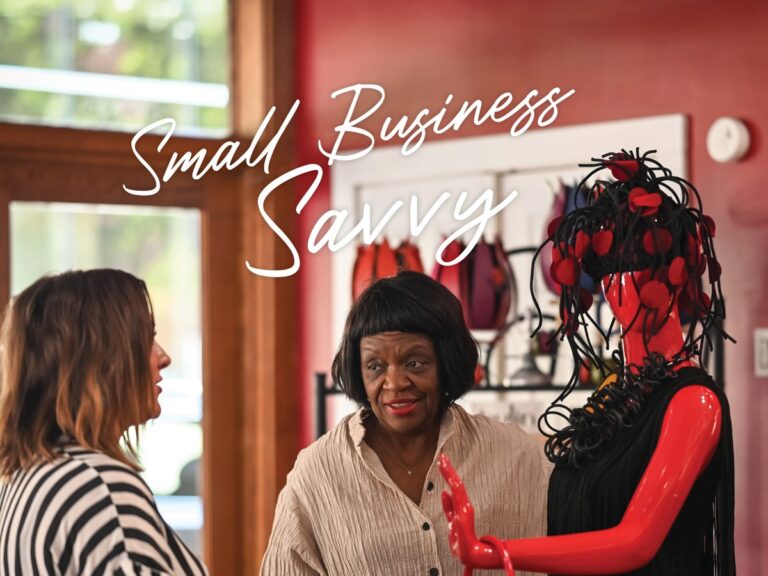The story below is a preview from our November/December 2022 issue. For more stories like it, Subscribe Today. Thank you!
Local business owners and advocates share what new entrepreneurs need to hear.
Ask any small-business owner how they started, and they’ll probably tell you it began as the tiniest glint of an idea. Maybe they found themselves thinking about it at work, or daydreaming through dinner. Eventually though, the daydreams crystallized into a plan – one they just couldn’t ignore.
Sound familiar? If so, you might be wondering whether 2023 is (finally!) the year to launch your new venture. To help you think through it, we asked a selection of small business owners and advocates about the tips and encouragements that new entrepreneurs most need to hear. Here’s what they shared …
Get ready to hustle.
These days, Kat Pascal is a familiar local presence. Most folks know her as the co-owner of Farmburguesa and commercial cleaning company Spotless America, as co-founder of Latinas Network, or as a counselor at the Small Business Development Center. But long before she was any of those things, she was dreaming of a better life.
“I was 21 at the time, Jimmy and I were expecting a baby, and we were both working in banking,” she remembers. “Daycare was going to drain our paychecks … and we started to think, ‘We need another source of income.’”
That’s how the idea of Spotless America was born. The couple deliberately picked a business they could run at night, allowing them to keep their day jobs as the business grew. But that meant working long hours.
“We just worked a lot,” Pascal admits. “Sometimes I would be outside in the car with the kids while Jimmy would clean.”
The couple made a list of dream clients, divided it up and competed with each other to win new business. “We were on our lunch breaks prospecting,” she recalls.
More than a decade later, their hard work has paid off… but Pascal stresses that it’s important to prepare yourself for the time investment that entrepreneurship can require. “There’s an emotional toll,” she says. “But it gets more manageable with experience as you learn to manage time and obstacles.”
Build a strategic plan.
Like many small-business owners, Carrie Poff – owner of Brown Hound Tree Service – remembers the early days when launching her business meant moving fast and pivoting quickly. She points to a critical moment when, in expectation of a coming ice storm, she worked overnight to get the company website up and running.
“The calls started to pour in the next day, and the phone hasn’t stopped ringing,” she says. But while many start-ups begin through similar spur-of-the-moment actions, those businesses often see new levels of success when they take time to form a strategic plan.
“[I] wish we had started with a written business plan,” Poff admits. She says Brown Hound reaped rewards when she participated in the Gauntlet – a business development program and competition run by the Advancement Foundation. “This is still opening doors for us!” she says.
But planning (and scaling) strategically often means seeking outside expertise – something that can feel uncomfortable, especially to entrepreneurs accustomed to being the chief experts in their business.
“I’ve worked with technology entrepreneurs and biotech commercializations for 10-15 years now, and everyone, to a person, that I work with holds some sort of technical degree,” says Lisa Garcia, director of RAMP Regional Accelerator and vice president for entrepreneurial development at Verge. “They’re very tech-savvy and so, so smart… [So] it takes practice to say, ‘I don’t know.’”
Still, seeking that outside help can be critical:
“A functional expert in law is expensive … but if you don’t get that legal piece right, you may lose all control of your intellectual property,” Garcia says as an example.
Many local resources are available for free – from counseling at the SBDC to mentoring at SCORE.
Think hard about when to quit your day job.
Diane Speaks never envisioned herself as a boutique owner. She’d worked for years as a flight attendant when many in the airline industry suddenly found themselves facing steep pay cuts. “I needed a Plan B,” she remembers.
That’s how she founded She’s International – a clothing and accessories shop in downtown Roanoke. Speaks began collecting and selling unique items from her travels, and before she knew it, she was an entrepreneur. That was in 2006. She continued to juggle the shop with her full-time work for the airlines until her retirement in 2014, she says.
“I would not do that again,” Speaks admits. “I would probably do both part-time, but these were both full-time positions… It was way too much.”
That feeling of having a foot in both worlds is familiar for many entrepreneurs, including Pascal, who continued to work in banking for five years until she could make the transition to full-time employment at her cleaning company.
“My kids had full benefits. Had I not been working in the corporate world, we might have been in trouble,” she remembers. “So we made sure we had things aligned.”
The couple enlisted an accountant to help them make that move strategically: “A lot of money was coming in, but a lot of money was going out for payroll… So we had to figure out how many jobs we’d have to secure to supplement my income,” she says.
Want to read more on this feature and get more small business advice, including on start-up capital, peer knowledge and what to do when the going gets tough? Get the latest issue on newsstands now or see it for free in our digital issue linked below!
The story below is a preview from our November/December 2022 issue. For more stories like it, Subscribe Today. Thank you!


